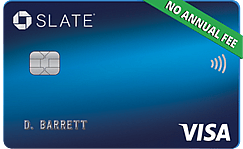11 Best Balance Transfer Credit Cards of February 2026
Many or all of the products on this page are from partners who compensate us when you click to or take an action on their website, but this does not influence our evaluations or ratings. Our opinions are our own.
Many or all of the products on this page are from partners who compensate us when you click to or take an action on their website, but this does not influence our evaluations or ratings. Our opinions are our own.
The best balance transfer credit cards charge no annual fee and offer at least 15 months of 0% APR for balance transfers. Using a balance transfer card wisely can save you hundreds, even thousands, of dollars in interest and help you get out of debt faster.
What matters most in a balance transfer credit card
A balance transfer card must save you money. That’s the whole point: You take a balance that’s sitting on a high-interest credit card, and you transfer that debt to one with a 0% introductory interest rate. That makes it easier and faster to pay off, since your entire payment can go toward the debt rather than interest. The catch is that balance transfers almost always incur a fee. So to make a transfer worthwhile, the money you save on interest must be greater than the fee. (Use our calculator lower down on the page to test the trade-offs.)
In choosing a card, start by considering how long it will take you to pay off your debt. The natural inclination is to go for the longest 0% period you can find. But if you only need a year to knock out your debt, you have many more options. A card with a 15-month interest-free period and a 3% transfer fee, for example, would save you more than one with a 21-month period and a 5% fee.
To be approved for a balance transfer card generally requires good to excellent credit, and there’s a limit to how much issuers will allow you to transfer. They’re not a realistic option for those with damaged credit.
How NerdWallet picked these balance transfer cards
Dozens of credit cards from major issuers offer 0% interest periods for balance transfers of 12 months or more. For this page, we chose the best options with introductory periods of at least 18 months, as well as the top-rated cash-back cards that have a period of at least 15 months. (Rewards give a card long-term value but shouldn’t be the primary consideration in a balance transfer card; the goal is to eliminate debt, not add to it.) We don't just assume that a longer 0% period is better. Different people look for different things in balance transfer cards, so this page offers a variety of options for a variety of situations. Learn more about our picks or see more about our methodology.
Expert tip: Choosing a balance transfer credit card
Paul Soucy, content director: “I see a lot of people fall into the same traps with balance transfer cards. First is assuming that an issuer will accept an unlimited amount of debt. If you have excellent credit and a $5,000 balance to transfer, you should have good options; if you have $60,000 in debt on multiple maxed-out cards, you probably won’t. Second is using repeated transfers to just park debt without doing anything to pay it off. As a temporary measure in an emergency, it’s understandable, but it can’t be a way of life. Last, people focus too much on the length of the 0% period and ignore the transfer fee. The less time you’ll need to pay off the debt, the more important the fee becomes.”
Our pick for: Extra-long intro period + no late fees
Apply Nowon Citibank's applicationon Citibank's applicationBalance transfer intro APR0% intro APR on balance transfers for 21 monthsPurchase intro APR0% intro APR on purchases for 12 monthsRegular APR17.49%-28.24% Variable APRAnnual fee$0Rewards rateN/AIntro offerN/ARecommended credit scoreCard details
- No Late Fees, No Penalty Rate, and No Annual Fee... Ever
- 0% Intro APR on balance transfers for 21 months and on purchases for 12 months from date of account opening. After that the variable APR will be 17.49% - 28.24%, based on your creditworthiness. Balance transfers must be completed within 4 months of account opening.
- There is an intro balance transfer fee of 3% of each transfer (minimum $5) completed within the first 4 months of account opening. After that, your fee will be 5% of each transfer (minimum $5).
- Stay protected with Citi® Quick Lock
- View Rates & Fees
NerdWallet's take
The Citi Simplicity® Card brings it with an extra-long 0% intro APR period for balance transfers — and you'll never pay late fees or a penalty APR.
Read full reviewProsThe intro APR period for balance transfers is this card's primary selling point, closing in on two years.
There's a relatively low introductory balance transfer fee: 3% or $5, whichever is greater, in the first four months. After that, the fee is 5% or $5, whichever is greater.
The absence of late fees is a benefit for the absent-minded, although you don't want to get in the habit of paying bills late. Other lenders aren't as forgiving, and chronic lateness can kill your credit scores.
$0 annual fee.
ConsBecause it doesn't earn rewards, there's not a lot of ongoing value to the card once that 0% period runs out.
The 0% period for purchases is shorter than for transfers, so while it's not a bad card for purchases, it's not ideal, either.
Our pick for: Long intro period + quarterly categories
Apply Nowon Discover's website,on Discover's website, or call 800-347-0264Balance transfer intro APR0% intro APR on balance transfers for 18 monthsPurchase intro APR0% intro APR on purchases for 6 monthsRegular APR17.49%-26.49% Variable APRAnnual fee$0Rewards rate1%-5%CashbackIntro offerCashback Match™Recommended credit scoreRewards breakdown
5%Cash back on everyday purchases at different places you shop each quarter like grocery stores, restaurants, gas stations, and more, up to the quarterly maximum when you activate.1%Cash back on all other purchases.Card details
- INTRO OFFER: Unlimited Cashback Match for all new cardmembers. Discover will automatically match all the cash back you’ve earned at the end of your first year! There’s no minimum spending or maximum rewards. You could turn $150 cash back into $300.
- Earn 5% cash back on everyday purchases at different places you shop each quarter like grocery stores, restaurants, gas stations, and more, up to the quarterly maximum when you activate. Plus, earn unlimited 1% cash back on all other purchases.
- Redeem cash back for any amount. No annual fee.
- Get a 0% intro APR for 18 months on balance transfers. Then 17.49% to 26.49% Standard Variable APR applies, based on credit worthiness.
- Terms and conditions apply.
- View Rates & Fees
NerdWallet's take
Most balance-transfer cards don't give you much of a reason to hold onto them after the 0% period ends. The Discover it® Cash Back - 18 Month Intro Balance Transfer Offer is a noteworthy exception. Get it for the balance-transfer benefits, keep it for the cash-back rewards.
Read full reviewProsThe introductory APR period for balance transfers is outstanding for a card that also has a robust rewards program.
There's a relatively low 3% introductory balance transfer fee, although the fee for future transfers is up to 5% (see terms).
$0 annual fee.
Rewards: 5% cash back in rotating categories that you activate, on up to $1,500 in category spending each quarter, and 1% on other purchases.
Discover matches the cash back you earn in your first year — although ideally in that first year you'll be focused more on paying down balances than adding to them.
ConsThe intro period on purchases is considerably shorter than that for balance transfers, so it's best to avoid putting purchases on the card until you've paid off transferred debt.
When it comes to rewards, the activation requirement for bonus categories can be a hassle.
Our pick for: All-around cash back
Apply Nowon Chase's websiteon Chase's websiteBalance transfer intro APR0% intro APR on balance transfers for 15 monthsPurchase intro APR0% intro APR on purchases for 15 monthsRegular APR18.24%-27.74% Variable APRAnnual fee$0Rewards rate1.5%-5%CashbackIntro offer$200Recommended credit scoreRewards breakdown
5%Cash back on travel purchased through Chase Travel℠.3%Cash back on drugstore purchases.3%Cash back on dining at restaurants, including takeout and eligible delivery services.1.5%Cash back on all other purchases.Card details
- Earn a $200 Bonus after you spend $500 on purchases in your first 3 months from account opening
- Enjoy 5% cash back on travel purchased through Chase Travel℠, our premier rewards program that lets you redeem rewards for cash back, travel, gift cards and more; 3% cash back on drugstore purchases and dining at restaurants, including takeout and eligible delivery service, and 1.5% on all other purchases.
- No minimum to redeem for cash back. You can choose to receive a statement credit or direct deposit into most U.S. checking and savings accounts. Cash Back rewards do not expire as long as your account is open!
- Enjoy 0% Intro APR for 15 months from account opening on purchases and balance transfers, then a variable APR of 18.24% - 27.74%.
- No annual fee – You won't have to pay an annual fee for all the great features that come with your Freedom Unlimited® card
- Keep tabs on your credit health, Chase Credit Journey helps you monitor your credit with free access to your latest score, alerts, and more.
- Member FDIC
- View Rates & Fees
NerdWallet's take
The Chase Freedom Unlimited® earns 5 stars for its generous cash-back rewards. Look a little closer, though, and you'll see it also offers a solid 0% intro APR period for balance transfers.
Read full reviewProsThe intro APR period isn't as long as you'd get on a dedicated 0% card, but the rewards and other benefits make this a solid option with significant long-term value.
Relatively low intro balance transfer fee: 3% or $5, whichever is greater, in the first 60 days; 5% or $5, whichever is greater, after that.
You earn 1.5% cash back on most purchases, plus 5% on travel booked through Chase and 3% at drugstores and restaurants. There's an attractive bonus offer for new cardholders, too.
$0 annual fee.
ConsYou can get a longer 0% period on transfers with other cards, including a couple that also earn cash back.
Our pick for: Longest intro period for transfers & purchases
Apply Nowon Wells Fargo's websiteon Wells Fargo's websiteBalance transfer intro APR0% intro APR for 21 months from account opening on qualifying balance transfersPurchase intro APR0% intro APR for 21 months from account opening on purchasesRegular APR17.49%, 23.99%, or 28.24% Variable APRAnnual fee$0Rewards rateN/AIntro offerN/ARecommended credit scoreCard details
- Apply Now to take advantage of this offer and learn more about product features, terms and conditions.
- 0% intro APR for 21 months from account opening on purchases and qualifying balance transfers. 17.49%, 23.99%, or 28.24% variable APR thereafter; balance transfers made within 120 days qualify for the intro rate, BT fee of 5%, min: $5.
- $0 annual fee.
- Up to $600 of cell phone protection against damage or theft. Subject to a $25 deductible.
- Through My Wells Fargo Deals, you can get access to personalized deals from a variety of merchants. It's an easy way to earn cash back as an account credit when you shop, dine, or enjoy an experience simply by using an eligible Wells Fargo credit card.
- View Rates & Fees
NerdWallet's take
If you're looking for breathing room to pay down debt, the Wells Fargo Reflect® Card boasts an intro APR period that's close to two years.
Read full reviewProsThe intro APR period for both balance transfers and purchases is among the longest available on a card from a major issuer.
$0 annual fee.
The card also offers cell phone insurance.
ConsThe balance transfer fee of 5% (minimum $5) is on the high end for cards in its class.
The card doesn't earn ongoing rewards on everyday spending, so its value is limited after the intro period ends.
Our pick for: Longest intro period for transfers & purchases
Apply Nowon Chase's websiteon Chase's websiteBalance transfer intro APR0% intro APR on balance transfers for 21 monthsPurchase intro APR0% intro APR on purchases for 21 monthsRegular APR18.24%-28.24% Variable APRAnnual fee$0Rewards rateN/AIntro offerN/ARecommended credit scoreCard details
- 0% Intro Offer- Enjoy 0% Intro APR for 21 months on purchases and balance transfers, then a variable APR of 18.24% - 28.24% thereafter
- No Annual Fee- You won't have to pay an annual fee for all the great features that come with your Slate Card
- Zero Liability Protection & Fraud Protection - You won’t be held responsible for unauthorized charges made with your card. We help safeguard your credit card purchases using sophisticated fraud monitoring. We monitor for fraud 24/7 and can text, email or call you if there are unusual purchases on your credit card.
- Chase Pay Over Time- Access more options to pay over time for eligible purchases made with your participating Chase credit card. With Pay Over Time, you can break up eligible purchases you've already made
- Get more purchasing power: Chase Slate® cardmembers may be eligible for a credit limit increase in as few as six months.
- Stay protected with purchase & travel benefits - Enjoy peace of mind with purchase protection, which safeguards your eligible new items against damage or theft for 120 days from the date of purchase, up to $500 per item. Plus, extended warranty protection adds an extra year to U.S. manufacturer warranties of three years or less, giving you up to four full years of coverage from the date of purchase
- Credit Journey: Access your credit score, receive customized score improvement plans from Experian™, and benefit from identity monitoring—all for free with Chase Credit Journey®
- Member FDIC
- View Rates & Fees
NerdWallet's take
The Chase Slate® doesn't require a lot of explanation. You get one of the longest introductory APR periods available from a major credit card issuer. If you're looking to get out from under high-interest debt, it's for you.
Read full reviewProsThis long introductory period on this card is the whole story: 0% intro APR on Purchases and Balance Transfers for 21 months, and then the ongoing APR of 18.24%-28.24% Variable APR.
$0 annual fee.
ConsNo rewards, so this card's value beyond the 0% period is limited.
While an earlier version of the Slate famously had no balance transfer fee, this card charges one: 5% of the amount of each transfer ($5 minimum).
Our pick for: 2% cash back
Apply Nowon Citibank's applicationon Citibank's applicationBalance transfer intro APR0% intro APR on balance transfers for 18 monthsPurchase intro APRN/ARegular APR17.49%-27.49% Variable APRAnnual fee$0Rewards rate2%-5%CashbackIntro offer$200Recommended credit scoreRewards breakdown
2%Cash back on every purchase with unlimited 1% cash back when you buy, plus an additional 1% as you pay for those purchases.Card details
- Earn $200 cash back after you spend $1,500 on purchases in the first 6 months of account opening. This bonus offer will be fulfilled as 20,000 ThankYou® Points, which can be redeemed for $200 cash back.
- Earn 2% on every purchase with unlimited 1% cash back when you buy, plus an additional 1% as you pay for those purchases. To earn cash back, pay at least the minimum due on time. Plus, earn 5% total cash back on hotel, car rentals and attractions booked with Citi Travel.
- Balance Transfer Only Offer: 0% intro APR on Balance Transfers for 18 months. After that, the variable APR will be 17.49% - 27.49%, based on your creditworthiness.
- Balance Transfers do not earn cash back. Intro APR does not apply to purchases.
- If you transfer a balance, interest will be charged on your purchases unless you pay your entire balance (including balance transfers) by the due date each month.
- There is an intro balance transfer fee of 3% of each transfer (minimum $5) completed within the first 4 months of account opening. After that, your fee will be 5% of each transfer (minimum $5).
- View Rates & Fees
NerdWallet's take
The Citi Double Cash® Card is renowned for its cash-back rewards. Scroll down the page when you go to apply for the card, and you'll discover that it comes with a terrific balance-transfer offer, too.
Read full reviewProsAs a balance-transfer card, there's a lot to like, including a lengthy introductory period for transfers.
Low intro balance transfer fee: 3% or $5, whichever is greater, in the first four months; 5% or $5, whichever is greater, after that.
The card has tremendous ongoing value. It earns 2% cash back on all purchases — 1% when you buy something and 1% when you pay it off.
There's also a bonus offer, although if you're trying to get out of debt, it's best to focus on paying down your balances, not adding to them.
$0 annual fee.
ConsThere's no 0% period for purchases. That means if you transfer a balance onto this card, you'll get no grace period, and you'll be paying interest on purchases right away. Your best move is to pay off the transferred debt first, then start using this card for the rewards.
Our pick for: Long intro period + side perks
Apply Nowon U.S. Bank's websiteon U.S. Bank's websiteBalance transfer intro APR0% intro APR on balance transfers for 18 billing cyclesPurchase intro APR0% intro APR on purchases for 18 billing cyclesRegular APR16.99%-27.99% Variable APRAnnual fee$0Rewards rate4%CashbackIntro offerN/ARecommended credit scoreRewards breakdown
4%Cash back on prepaid air, hotel and car reservations booked directly in the Travel Center.Card details
- 0% intro APR on purchases and balance transfers for 18 billing cycles. After that, a variable APR currently 16.99% - 27.99%.
- 4% cash back on prepaid air, hotel and car reservations booked directly in the Travel Center when you use your card.
- Get a $20 annual statement credit for 11 consecutive months of purchases.
- No annual fee.
- Cell Phone Protection: Your eligible cell phone can be reimbursed up to $600 in the event it is stolen or damaged when you pay your monthly cell phone bill with your card.
- Terms and conditions apply.
- View Rates & Fees
NerdWallet's take
The U.S. Bank Shield™ Visa® Card is ideal for financing a large purchase or zapping existing debt, and it even comes with a few extra goodies.
Read full reviewProsThis card offers a lengthy break from interest, as well as some reasons to keep it around long term:
Low introductory transfer fee: See Terms. Balance transfers must be made within 60 days of account opening. (This offer may differ if you apply directly via U.S. Bank.)
The card earns 4% cash back on prepaid air, hotel and car reservations booked directly in U.S. Bank’s Rewards Center. You can also earn a modest statement credit each year with qualifying purchases, and you'll get cell phone insurance when you use the card to pay your cell bill.
$0 annual fee.
ConsIt's possible to find lengthier intro APR offers, even on U.S. Bank's own website. And if you're willing to accept a slightly shorter intro APR window, you can find cards with superior rewards.
Our pick for: Extra-long balance transfer offer
Apply Nowon Citibank's applicationon Citibank's applicationBalance transfer intro APR0% intro APR on balance transfers for 21 monthsPurchase intro APR0% intro APR on purchases for 12 monthsRegular APR16.49%-27.24% Variable APRAnnual fee$0Rewards rateN/AIntro offerN/ARecommended credit scoreCard details
- 0% Intro APR on balance transfers for 21 months and on purchases for 12 months from date of account opening. After that the variable APR will be 16.49% - 27.24%, based on your creditworthiness. Balance transfers must be completed within 4 months of account opening.
- There is a balance transfer fee of either $5 or 5% of the amount of each transfer, whichever is greater
- Get free access to your FICO® Score online.
- With Citi Entertainment®, get special access to purchase tickets to thousands of events, including concerts, sporting events, dining experiences and more.
- No Annual Fee - our low intro rates and all the benefits don’t come with a yearly charge.
- View Rates & Fees
NerdWallet's take
The Citi® Diamond Preferred® Card is all about the long 0% intro APR period. It's about as much breathing room as you'll find anywhere for transferring debt.
Read full reviewProsThe long intro period for transfers is this card's defining feature, giving you more than a year and a half to whittle down debt.
$0 annual fee.
ConsThe 5% balance transfer fee (minimum $5) is on the high end.
The card doesn't earn rewards, so there's limited long-term value.
The intro APR period for purchases is shorter than for transfers.
Our pick for: Long intro period + gas and dining rewards
Apply Nowon Discover's website,on Discover's website, or call 800-347-0264Balance transfer intro APR0% intro APR on balance transfers for 18 monthsPurchase intro APR0% intro APR on purchases for 6 monthsRegular APR17.49%-26.49% Variable APRAnnual fee$0Rewards rate1%-2%CashbackIntro offerCashback Match™Recommended credit scoreRewards breakdown
2%Cash back at Gas Stations on up to $1,000 in combined purchases each quarter, automatically.2%Cash back at Restaurants on up to $1,000 in combined purchases each quarter, automatically.1%Cash back on all other purchases.Card details
- INTRO OFFER: Unlimited Cashback Match for all new cardmembers. Discover will automatically match all the cash back you’ve earned at the end of your first year! There’s no minimum spending or maximum rewards.
- Earn 2% cash back at Gas Stations and Restaurants on up to $1,000 in combined purchases each quarter, automatically. You'll still earn unlimited 1% cash back on all other purchases.
- Get a 0% intro APR for 18 months on balance transfers. Then 17.49% to 26.49% Standard Variable APR applies, based on credit worthiness.
- Redeem cash back for any amount
- No annual fee.
- Terms and conditions apply.
- View Rates & Fees
NerdWallet's take
The rewards on the Discover it® Chrome aren't especially strong compared with other cash back cards, but the introductory APR period stands out for those looking to transfer a balance.
Read full reviewProsThe introductory APR period on balance transfers is excellent for a rewards credit card. Most cash back cards with balance transfer offers are in the 12- to 15-month range.
There's a relatively low 3% introductory balance transfer fee. However, for future transfers, the fee is up to 5% (see terms).
Rewards: This card pays 2% cash back at restaurants and gas stations, on up to $1,000 in purchases each quarter; other purchases earn 1%.
This card has a bonus offer as well.
$0 annual fee.
ConsThe intro period on purchases is considerably shorter than that for balance transfers, so it's best to avoid putting purchases on the card until you've paid off transferred debt.
Our pick for: Quarterly cash back categories
Apply Nowon Chase's websiteon Chase's websiteBalance transfer intro APR0% intro APR on balance transfers for 15 monthsPurchase intro APR0% intro APR on purchases for 15 monthsRegular APR18.24%-27.74% Variable APRAnnual fee$0Rewards rate1%-5%CashbackIntro offer$200Recommended credit scoreRewards breakdown
5%Cash back on up to $1,500 in combined purchases in bonus categories each quarter you activate.5%Cash back on travel purchased through Chase Travel℠.3%Cash back on dining.3%Cash back at drugstores.1%Cash back on all other purchases.Card details
- Earn a $200 Bonus after you spend $500 on purchases in your first 3 months from account opening
- 5% cash back on up to $1,500 in combined purchases in bonus categories each quarter you activate. Enjoy new 5% categories each quarter!
- 5% cash back on travel purchased through Chase Travel℠, our premier rewards program that lets you redeem rewards for cash back, travel, gift cards and more
- 3% cash back on drugstore purchases and dining at restaurants, including takeout and eligible delivery service, and unlimited 1% cash back on all other purchases.
- No minimum to redeem for cash back. You can choose to receive a statement credit or direct deposit into most U.S. checking and savings accounts. Cash Back rewards do not expire as long as your account is open!
- 0% Intro APR for 15 months from account opening on purchases and balance transfers, then a variable APR of 18.24% - 27.74%.
- No annual fee – You won't have to pay an annual fee for all the great features that come with your Freedom Flex® card
- Keep tabs on your credit health - Chase Credit Journey helps you monitor your credit with free access to your latest score, real-time alerts, and more.
- Member FDIC
- View Rates & Fees
NerdWallet's take
With a solid 0% intro APR offer for balance transfers, the Chase Freedom Flex® is more than a 5-star rewards card — although its inviting combination of bonus categories and generous sign-up offer have made it a perennial favorite for cash back.
Read full reviewProsLike its sibling, the Chase Freedom Unlimited®, this card doesn't have the longest 0% APR period for transfers, but there's such strong long-term value that it's worth considering.
Relatively low intro balance transfer fee: 3% or $5, whichever is greater, in the first 60 days; 5% or $5, whichever is greater, after that.
The card offers bonus cash back of 3% to 5% on certain travel, at restaurants and drugstores, and in categories that change each quarter. Other spending earns 1% cash back. New cardholders can earn a strong bonus, too.
$0 annual fee.
ConsYou can get a longer 0% period on transfers with other cards, including a couple that also earn cash back.
The rotating quarterly 5% cash back categories give this card a lot of its appeal, but they do require some work, since you have to opt into them every three months.
Our pick for: Military
Balance transfer intro APR0.00% intro APR on qualifying balance transfers for 12 monthsPurchase intro APRN/ARegular APR10.49%-18.00%, Variable APRAnnual fee$0Rewards rateN/AIntro offerN/ARecommended credit scoreCard details
NerdWallet's take
Balance transfer savings calculator
Transferring debt to a credit card with a 0% introductory annual percentage rate, or APR, could save you hundreds of dollars in interest while you pay down your debt.

More about our picks
Wells Fargo Reflect® Card
APR offer: 0% intro APR for 21 months from account opening on purchases and qualifying balance transfers, and then the ongoing APR of 17.49%, 23.99%, or 28.24% Variable APR.
Why we chose the Wells Fargo Reflect® Card as one of our best balance transfer credit cards: The Wells Fargo Reflect® Card has one of the most accommodating introductory APR offers available from a major issuer, with a promotional period approaching two years for balance transfers. It's worth noting that there's an equally long intro period for purchases. Several competing cards offer a lengthly 0% period for transfers but a shorter one (or none at all) for purchases. This one does both. Although we generally advise against carrying debt on new purchases from month to month, especially when you're doing balance transfers to handle existing debt, the matching periods for purchases and transfers nevertheless afford you maximum flexibility. The biggest downside for this card is the 5% balance transfer fee ($5 minimum), which is on the high side and explains why this card doesn't earn 5 stars in our ratings formula for balance transfer cards. The card also doesn't earn rewards, so there's not a ton of ongoing value after the promotional period runs out.
Chase Slate®
APR offer: 0% intro APR on Purchases and Balance Transfers for 21 months, and then the ongoing APR of 18.24%-28.24% Variable APR.
Why we chose the Chase Slate® as one of our best balance transfer credit cards: Nearly everything we just said about the Wells Fargo Reflect® Card card, we could say about the Chase Slate®. With an intro APR period of 21 months, it offers more breathing room than just about any other card available from a top issuer. That period applies to both purchases and transfers. The drawbacks are similar, too. Unlike an earlier iteration of the Slate brand, this card charges a balance transfer fee, and it's on the high side: $5 or 5% of the amount transferred, whichever is greater. This card also does not offer a bonus, ongoing rewards or perks, so it has limited long-term value.
Citi Simplicity® Card
APR offer: 0% intro APR on purchases for 12 months and 0% intro APR on balance transfers for 21 months, and then the ongoing APR of 17.49%-28.24% Variable APR.
Why we chose the Citi Simplicity® Card as one of our best balance transfer credit cards: Three standout features of the Citi Simplicity® Card made it our choice for best balance transfer credit card in the 2025 NerdWallet Best-Of Awards. First is the extra-long introductory APR period on balance transfers, which is one of the longest you'll find from a major issuer. Second is the fact that the card doesn't charge late fees or a penalty APR (that is, a higher interest rate some issuers impose if you're late with a payment or violate some other rule). Obviously, you should always strive to make payments on time, but the forgiveness offered by this card can be a lifesaver to someone working to eliminate debt. Third, the card has a relatively low introductory balance transfer fee (see the pros and cons about this card, above). However, beware of the mismatch between the intro APR periods for purchases and balance transfers. This card also earns no rewards, so its long-term value is limited.
Citi® Diamond Preferred® Card
APR offer: 0% intro APR on purchases for 12 months and 0% intro APR on balance transfers for 21 months, and then the ongoing APR of 16.49%-27.24% Variable APR.
Why we chose the Citi® Diamond Preferred® Card as one of our best balance transfer credit cards: This card is a decent alternative to the Citi Simplicity® Card. You get a nice, long introductory APR period for balance transfers and a shorter one for purchases. But it doesn't have the late-fee protection of the Simplicity, nor does it have any kind of promotional balance transfer fee. Otherwise, the same cautions apply to this card as to the Simplicity: The mismatched intro periods might trip you up if you're not careful, and the lack of rewards means the card's long-term value is limited.
U.S. Bank Shield™ Visa® Card
APR offer: 0% intro APR for 18 billing cycles on purchases and balance transfers, and then the ongoing APR of 16.99%-27.99% Variable APR.
Why we chose the U.S. Bank Shield™ Visa® Card as one of our best balance transfer credit cards: The U.S. Bank Shield™ Visa® Card has different intro APR offers depending on where you get the card. The offer available through NerdWallet includes a lengthy promotional period for both balance transfers and purchases, as well as a low introductory balance transfer fee (see rates and fees). On U.S. Bank's own site, the card offers a longer intro APR period — but it also lacks the lower promotional transfer fee. Do the math: If you won't need more than a year and a half to pay down the balance you're planning to transfer, then you're better off going with the shorter 0% window and the lower fee. As with most other balance transfer cards with a promotional period this long, the card doesn't have tremendous long-term value, although it does earn cash back on certain travel purchases made through U.S. Bank.
BankAmericard® credit card
The BankAmericard® credit card is not currently available on NerdWallet. Details about the BankAmericard® credit card were collected by NerdWallet and have not been provided or reviewed by the issuer of this card.
APR offer: As of Jan. 23, 2026, this card had a 0% intro APR for 18 billing cycles for purchases, and for any balance transfers made in the first 60 days. After the intro APR offer ends, a Variable APR of 14.49%-24.49% will apply.
Why we chose the BankAmericard® credit card as one of our best balance transfer credit cards: There's nothing fancy about the BankAmericard® credit card, but there doesn't need to be. The card offers a good introductory APR period for balance transfers and purchases, as well as an introductory balance transfer fee of 3% for transfers in the first 60 days your account is open. That intro fee is on the low end of the typical range; it rises to 4% after that 60-day window. The card has no rewards; the APR promotion is its raison d'etre.
Discover it® Cash Back - 18 Month Intro Balance Transfer Offer
APR offer: 0% intro APR on Purchases for 6 months and 0% intro APR on Balance Transfers for 18 months, and then the ongoing APR of 17.49%-26.49% Variable APR.
Why we chose the Discover it® Cash Back - 18 Month Intro Balance Transfer Offer as one of our best balance transfer credit cards: Long-term value is the reason this card stands out so much. Yes, you get a long intro APR period on balance transfers, but unlike most cards with competing promotional periods, this one also gives you ample reason to keep using the card: 5% cash back in rotating categories that you activate (on up to $1,500 per quarter in spending), and 1% cash back on other purchases. It's those rewards that earn this card its high star rating. Note that the intro APR period for purchases is considerably shorter, however. Your best bet might be to hold off on using it for purchases until you've fully paid off transferred debt.
Discover it® Chrome
APR offer: 0% intro APR on Purchases for 6 months and 0% intro APR on Balance Transfers for 18 months, and then the ongoing APR of 17.49%-26.49% Variable APR.
Why we chose the Discover it® Chrome as one of our best balance transfer credit cards: The Discover it® Chrome is rather underwhelming as a cash-back card, offering weak rewards relative to its competitors, but it scores high as a balance transfer card. You get a long intro APR period for balance transfers, and a shorter one for purchases. The rewards at least give the card a certain amount of long-term value. Because of the mismatched intro APR periods, our advice with this card is the same as for the other Discover offering on this page: Pay off your transferred balance, then shift to using the card for purchases.
Citi Double Cash® Card
APR offer: 0% intro APR on balance transfers for 18 months, and then the ongoing APR of 17.49%-27.49% Variable APR.
Why we chose the Citi Double Cash® Card as one of our best balance transfer credit cards: The Citi Double Cash® Card has long been one of NerdWallet's top recommendations for people looking for simple credit card rewards, as it earns an impossible-to-mess-up 2% cash back on every purchase (1% when you buy something and 1% when you pay it off). But it also comes with one of the stronger balance transfer offers on the market. There is no 0% intro APR period for purchases, however — not even a short one like some other cards have. So if you are using this card for a balance transfer, don't put purchases on it until that debt has been fully paid off. As long as you're carrying a transferred balance, you will not have a grace period on purchases, so you'll pay interest on them. But you'll have reason to use it (and use it often) long after the promotional period ends.
Chase Freedom Unlimited® and Chase Freedom Flex®
Chase Freedom Unlimited® APR offer: 0% intro APR on purchases and Balance Transfers for 15 months, and then the ongoing APR of 18.24%-27.74% Variable APR.
Chase Freedom Flex® APR offer: 0% intro APR on Purchases and Balance Transfers for 15 months, and then the ongoing APR of 18.24%-27.74% Variable APR.
Why we chose the Chase Freedom Unlimited® and the Chase Freedom Flex® among our best balance transfer credit cards: These cards both earn 5 stars for their cash back rewards, but each also comes with a balance transfer offer that's only a smidge below what you get from many cards that are entirely devoted to balance transfers. The intro APR period for transfers might not be as long as what you get on, say, the Wells Fargo Reflect® Card or the Citi Simplicity® Card, but it's still well over a year. Both cards have a relatively low balance transfer fee for new cardholders (see the pros and cons for each card above). Each has a matching intro APR period for purchases, so they're also strong options for financing a large purchase. And each offers terrific long-term value:
Chase Freedom Unlimited®: 5% cash back on travel booked through Chase; 3% at restaurants and drugstores; 1.5% on other purchases.
Chase Freedom Flex®: 5% cash back in rotating categories that you activate (on up to $1,500 per quarter in spending); 5% on travel booked through Chase; 3% at restaurants and drugstores; 1% on other purchases.
Navy Federal Credit Union® Platinum Credit Card
APR offer: 0.99% intro APR for 12 months from account opening on balance transfers made within the first 60 days, and then the ongoing APR of 10.99%-18.00%, Variable APR.
Why we chose the Navy Federal Credit Union® Platinum Credit Card as one of our best balance transfer credit cards: The Navy Federal Credit Union® Platinum Credit Card does not have a 0% intro APR offer, but it's awfully close at 0.99%. More important, the card does not charge a balance transfer fee. The money you'd save by not having to pay 3% to 5% of the transfer amount upfront will outweigh the cost of carrying debt at a rate under 1%. However, the intro period is only 12 months, as opposed to 15-21 months on competing cards. And Navy Federal Credit Union membership isn't open to everyone — just people with military ties.
Who can qualify for a balance transfer credit card?
NerdWallet readers usually land on this page because they’ve concluded that a balance transfer is a good move, and now they’re just looking for the right balance transfer credit card. Below, we’ll go into detail on how to choose among your options. But first, it’s worth quickly reviewing your situation to ensure you don’t apply for a card just to get met with a rejection.

NerdWallet credit card expert Sally French goes over the basics of balance transfer credit cards.
Generally speaking, you’ll need good to excellent credit to be approved for a balance transfer credit card. That can be roughly defined as a credit score of 690 or better. But credit scores alone don’t guarantee approval for any card. Other factors include your income and your other debts. Because of this, people with credit scores above 800 can (and do) get rejected for balance transfer cards. And people with scores below 690 can (and do) get approved. We took a look at approval rates for credit cards on this page among people who have registered for NerdWallet and activated their free credit score.
Over a 10-month period in 2024, the average credit score among applicants for balance transfer credit cards on this page was 701. The average credit score among those approved was 727. The majority of applicants with scores over 720 were approved. However, our data show that some people with scores below 690 — sometimes referred to as “fair” credit — were still able to qualify.
Choosing a balance transfer credit card
This page includes a variety of balance transfer cards, each of which delivers value in its own way. Some of them offer a 0% introductory APR period and not much more. Others pay rewards on your spending, meaning they can continue to deliver value long after the 0% period ends. Here’s what to consider when looking at balance transfer cards.
Card issuer
Length of 0% introductory APR period
Balance transfer fee
Annual fee
Long-term value
Next steps: Using your balance transfer credit card
If the balance transfer math works in your favor, here’s what to do.
1Choose a card and apply
2Tell the new card’s issuer you want to do a transfer
3Continue making payments on the old card
4 Pay down the debt on the new card
Common balance transfer credit card mistakes
A balance transfer credit card can be a powerful tool for getting out from under high-interest credit card debt. But as with any tool, you have to know how to use it for it to be effective. We’ve touched on some of these already, but here are the most common mistakes people make with their balance transfer card.
Applying for a card from the wrong issuer
We mentioned above that you can’t transfer debt from, say, the Chase Sapphire Preferred® Card to the Chase Freedom Unlimited®. That’s because both of these cards are issued by Chase, and you can’t transfer debt among cards from the same issuer. But Chase issues plenty of credit cards that don’t have “Chase” in the name — United℠ Explorer Card, for example, or the Marriott Bonvoy Boundless® Credit Card. You can’t transfer debt from any of those cards to a Chase-branded card either. So double-check which bank issued your card, regardless of which brand name is on the front.
Assuming how much debt can be transferred
If your only significant credit card debt is a $3,000 balance that you want to transfer, and you otherwise have good credit, you have a good chance of getting approved for a balance transfer credit card — and for getting a credit limit high enough to move it all. By contrast, if you have $40,000 in balances spread across a few maxed-out cards, you might not get approved for a balance transfer card at all, no matter how good your credit. Or you might get approved, but not with enough of a credit limit to move much of the debt.
Card issuers don’t offer balance transfer cards out of the goodness of their hearts. They do it to make money. They can make some money from the transfer fee, and if they can turn you into a long-term customer, they make money from your future business. But they can’t make money if a cardholder transfers debt and then defaults on it. So they’re careful about whom they approve, and for how much.
That’s why consumers can’t assume that a balance transfer credit card will be a simple solution when they are deep in debt.
Missing payments on the old card
As discussed above, even after requesting a balance transfer, continue making payments on the old card until you see that the debt no longer appears on the account. The transfer process isn’t instantaneous: Your new card issuer has to send the money to the issuer of the old card, and it has to be directed to the proper account.
This is where some people get tripped up. They request the transfer, then just wait for the balance to appear on the new card. They stop paying attention to the old card and end up missing a payment, incurring a late fee or even damaging their credit. So keep an eye on the old account, and if there’s a payment due, pay at least the minimum.
Losing your 0% rate with a missed payment
Once you’ve moved debt onto a card with a 0% period in effect, it’s critical to make your payments on time every single month. If you’re late, the card issuer could cancel your 0% promotion, and you’ll be back to paying sky-high credit card interest rates on your debt.
Playing hot potato with credit card debt
Sometimes finances get tight, and you simply don’t have the means to aggressively pay down your credit card debt, even with a 0% period in effect. In those circumstances, moving debt to a balance transfer card and paying only the minimum for a few months can buy you some breathing room. You do what you have to do.
You don’t want it to become a habit, though. For one thing, you’re mostly treading water rather than getting ahead. The transfer fee (which usually gets tacked onto the balance you transfer) sets you back at the start, and the minimum monthly payments are fairly small — maybe 1% to 3% of the balance. For another, having debt parked at 0% can encourage you to view that debt as “taken care of” for now, which can in turn encourage more spending and more debt. Then the 0% period runs out and you rush to try to move the balance to another 0% card — playing hot potato with debt rather than getting rid of it.
Ask our credit card experts
 Melissa Lambarena
Melissa Lambarena
WHERE CAN PEOPLE RUN INTO TROUBLE WITH A BALANCE TRANSFER?
With a balance transfer, you have to do the math to make sure that balance transfer fee is worth it. If it saves you money compared with the interest you’d pay with your current credit card over time, it can be a useful tool for paying down debt aggressively. Have a strategy in place when using a balance transfer credit card. Curb any habits that may have led to the debt, build an emergency fund to prevent further debt and switch your payment method to debit or cash to make more progress on paying off the balance.
Melissa Lambarena
Senior Writer & Content Strategist
 Funto Omojola
Funto Omojola
WHERE CAN PEOPLE RUN INTO TROUBLE WITH A BALANCE TRANSFER?
Balance transfer credit cards can be good debt management tools because they can save you money on interest payments. But you'll still need to be hands on with your debt and have a repayment plan. A late payment can cause you to lose your introductory 0% APR period and result in a penalty APR that’s higher than the card’s regular rate — which can leave you in a worse financial shape than when you started.

Funto Omojola
Lead Writer & Content Strategist
 Paul Soucy
Paul Soucy
WHERE CAN PEOPLE RUN INTO TROUBLE WITH A BALANCE TRANSFER?
Many people hoping to do a balance transfer end up surprised and disappointed when they don't get enough of a credit limit to transfer all the debt they need to move. You might have $20,000 in debt you hope to transfer but only get approved to transfer $3,000.

Paul Soucy
Director of Content
 Kenley Young
Kenley Young
WHERE CAN PEOPLE RUN INTO TROUBLE WITH A BALANCE TRANSFER?
I've used several balance transfer credit cards as successful debt-zapping tools. If you have significant debt, it'll generally be worth paying the balance transfer fee. Even if you don't get a credit limit high enough to tackle all of your outstanding debt, that's fine. You can start small and attack your balance(s) brick by brick.

Kenley Young
Managing Editor
Frequently asked questions
What is a balance transfer?
A balance transfer involves moving debt from a high-interest credit card to a new card with a lower interest rate, ideally one with an introductory 0% period. Essentially, you're using one card to pay off another, but because you aren't paying as much in interest, you have more money available to pay down your debt more quickly.
What should I look for in a balance transfer card?
When evaluating balance transfer credit cards, you'll want to pay attention to:
The balance transfer fee. Most cards charge a fee of 3% to 5% of the amount transferred. That translates to $30 to $50 for each $1,000 transferred. A handful of cards charge no transfer fee, although such offers are hard to find and can be difficult to qualify for.
The introductory interest rate (APR). Credit cards designed for balance transfers offer a lower interest rate on transfers for a certain period of time after you open the account. Usually, this promotional rate is 0%, but on some cards it might be something like 2.99%.
The length of the intro APR period. The best balance transfer credit cards offer 15 months or more at 0%. When the promotional period ends, the interest rate shoots up, so you'll want to have your debt paid off by the end of that time.
The annual fee. The point of a balance transfer is to save money, so you shouldn't be paying an annual fee.
The issuer. You typically can't transfer debt between cards from the same issuer. For example, if you have debt on a Citi credit card, you can't move it to another Citi card.
Who can qualify for a balance transfer card?
In most cases, you'll need good to excellent credit to qualify for a card with an introductory 0% period. That generally means a credit score of 690 or better. However, credit scores alone aren't the only factor that card issuers take into consideration. A person with an excellent credit score could still be rejected; a person with a score in the mid-600s might still be approved.
How does a balance transfer work?
The first step in executing a balance transfer is applying for a balance-transfer credit card. Once you're approved for the new card, tell that card's issuer that you want to do a transfer. (You can sometimes do this through your credit card's online portal or mobile app; in other cases, you'll have to call the number on the back of the card.)
The new card's issuer will ask for information about the balance you want to transfer, including the financial institution, the account number and the amount of the debt. Depending on your credit limit and the issuer's rules, you may be approved for the full amount of the transfer or only a portion.
The transfer can take a while, so keep an eye on both accounts until the debt disappears from the old one and shows up in the new one. Make at least the minimum payments on the old account until the debt is transferred.
Does a balance tranfer help your credit score?
A balance transfer by itself isn't going to have much of an effect on your credit score. The transfer doesn't make the debt go away; it simply moves it to a new place. In fact, applying for the balance transfer card could knock a few points off your score in the short term.
What matters is what you do after you transfer your balance. If you take advantage of the breathing room and significantly reduce your debt, your credit can benefit, since the amounts you owe are a significant factor in your scores.
Is there a downside to a balance transfer?
If you'll have the money to pay off your credit card debt within a month or two, you're probably better off not bothering with a balance transfer. That's because the transfer fee you'd have to pay would probably outweigh any interest that would accumulate during that time. But if paying off that debt will take three or four months, or longer, your interest savings will probably more than make up for the fee.
If you take advantage of a 0% balance transfer offer to aggressively pay off what you owe, there's no real downside. The money you save on interest can instead go toward eliminating the debt even more quickly. But if all you're doing is "parking" debt on a 0% card and paying only the required minimum without a plan to significantly reduce what you owe, you're only treading water. The 0% period will run out and you'll be right back where you started.
What's the easiest balance transfer card to get?
For a credit card issuer, taking on a consumer's existing debt at 0% interest is a risk, so issuers are careful about whom they approve for a balance transfer. Generally speaking, issuers are reluctant to take balance transfers from people with credit scores much below 700. Each issuer evaluates applications according to its own risk-assessment rubrics; what might be an "easy" card for one applicant to get could be completely unattainable for someone else. As a result, there's no single balance transfer card that you can confidently say is the "easiest" to quality for.
Methodology
NerdWallet's Credit Cards team selects the best balance transfer credit cards based on overall consumer value, as evidenced by star ratings, as well as their suitability for specific kinds of consumers. Factors in our evaluation include annual fees, balance transfer fees, the length of each card's 0% introductory APR period, ongoing APRs, credit-profile requirements, cardholders' access to credit scores, and other noteworthy features such as rewards or perks that give the card ongoing value beyond the promotional APR period. Learn how NerdWallet rates credit cards.













